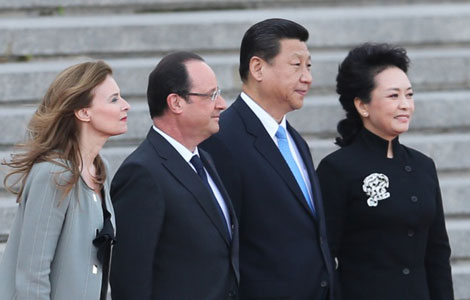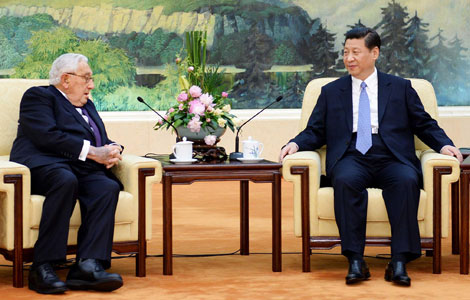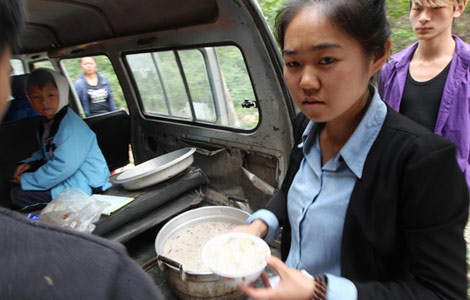Get fruity, like Romeo
Updated: 2013-04-26 07:22
By Mariella Radaelli (China Daily)
|
||||||||
|
Terry Xu believes that Italian red wine is more suited to Chinese tastes. Provided to China Daily |
Italian wine makers learn how to rival french in romancing the eager, young chinese market
Unless is was a ros by any other name, wine played little part in Romeo's wooing of Juliet in fair Verona. But the most romantic of spirits was to the fore in the city this month as the Italian wine industry set out to woo Chinese consumers.
And, as is the way of 21st century courtship, its advances most likely will be conducted online.
At present, Italian wines only account for 6 percent of the Chinese market, losing ground in the past two years to be overtaken by Chilean and Spanish producers, all vying to chase down second-placed Australia and challenge the dominance of the major suitor, French wines, which account for 48 percent of the market.
So, how better to compete with their great romantic neighbors and rivals was the big question on Italian wine makers' lips when a Chinese trade delegation of government officials and online sellers visited the 47th Vinitaly fair this month in Verona, said to be the world's largest exhibition of wines and spirits, attracting more than 4,200 companies.
"I would like to see Italian wine as a protagonist in China," says Giovanni Mantovani, CEO of Verona Fair, the event organizer, as he introduced a seminar on the Chinese wine market and welcomed the delegation. "China represents the most important emerging market for Italian wine today."
China's wine imports grew almost 40 percent and consumption almost doubled from 2008 to 2012, and the market has "huge growth prospects for the coming years, given that wine drinking is a relatively recent phenomenon" in the country, says Wang Xuwei, general secretary of the China Association for Importers and Exporters of Wine and Spirits, who led the Vinitaly delegation.
Wang went on to explain that the Chinese taste for wine was developing apace as incomes grow and the burgeoning middle and business classes adopt a more Western lifestyle.
"Currently, French wine represents about half of Chinese imports, as French producers were the first ones to sell their products in China," he says. "They did this successfully by getting Chinese consumers accustomed to the taste, believing they would grow fond of it."
This is what Italian producers wanted to hear, as they called for better trading and marketing strategies by the home industry: How to best compete against other nations, particularly France?
One answer, it seems, lies in correctly assessing the Chinese character as much as Chinese tastes in food and drink.
"In China, 80 percent of wine consumption is reds," Wang says. "Nevertheless, white wine consumption is strongly increasing, especially if we think about sparkling wines."
Another key factor was the 190 million online shoppers in China, a factor addressed at the digital media seminar at Vinitaly, featuring on the panel representatives from some of China's major retail sites, such as YesMyWine, Tmall, Alibaba Group, M1NT Cellars and Vinehoo.
"About 40 percent of Chinese buy wine online," says Jared Liu, CEO of YesMyWine, the biggest e-commerce wine site in China, selling on average 20,000 bottles a day.
"The Chinese are shy. On the Internet, however, they become more aggressive and active in purchasing their wine.
"Consumers are eager to become better educated about wine, and like to discuss and compare labels with one another through social networks."
Prominent in that education process is Terry Xu, one of China's most influential wine bloggers. He is a wine columnist for several magazines, has made hundreds of videos "to educate the Chinese on wine", and works as a wine consultant for YesMyWine in Shanghai.
"I give them a lot of suggestions - which wine should be chosen for a special occasion, which bottle should be taken to a party."
The 30-year-old oenologist and former sommelier, who trained and worked in Bordeaux promoting its wines, was one of the featured experts at the Opera Wine tasting event held by Wine Spectator magazine at the Verona fair.
He believes Italian producers can capitalize on China's great preference for red wine as their varieties are more suited to Chinese tastes than French ones.
The Chinese palate can be very sensitive to tannins that are found mainly in red wine, and more so in French reds, Xu says.
"Generally, the Chinese don't like that tactile astringent sensation of tannins, which makes the wine taste bitter. We prefer something more fruity. That's why Italian wine would be more suitable for us.
"French wine is for the connoisseur only. It's something more complicated, while Italian wine is easier to understand."
According to Xu, "The Chinese just drink French wine because the promotion behind the products is done really well. The French are great at marketing."
Back at the seminar, this point was picked up by Jared Liu of YesMyWine, who thought Italian brand and label names were difficult to remember for a Chinese consumer.
"It could be a case of creating a corresponding Chinese name for each particular wine", he says. "The ease in pronouncing its Chinese name could certainly help but smart marketing also has to be an important factor."
Xu says that about 90 percent of wine in China is red, but the whites' turn could yet come, and sales are already beginning to sparkle for some varieties.
"We consume more red wine because red means lucky in China, while white evokes sadness. But it will change soon. Just recently we have started drinking more white wine because we are eating larger quantities of seafood."
Last year, sparkling wine accounted for 3.8 percent of the Italian wines exported to China by value, and is growing in popularity, particularly with younger Chinese. Italy generally had almost doubled exports of sparkling wine, such as Prosecco and Asti, from the previous year, and after France was the biggest supplier to China.
"In fact, to start a Chinese consumer with Italian wine, I would actually recommend Prosecco and Moscato d'Asti," Xu says. "Both being quite fruity, they're perfect for a party with friends, ideal as an aperitivo."
Xu also says Italian wine perfectly pairs with Chinese cuisine. "Our dishes are certainly spicy and a bit oily, so Moscato d'Asti is best suited to accompany them."
Among non-sparkling whites, he recommends Pinot Grigio, a favorite with Americans. "With its potpourri of flowers, waxy fruits and honey, it should always be present on the tables of the Chinese."
And if you must stick with reds?
"The outstanding Tuscan wines, I would say. They include the priciest and most prestigious ones. I love them so much, but they are too expensive for me."
But for Xu, caught between his experience with Bordeaux and the racier or more delicate tones of Chinese tastes, the real beauty and attraction of wine is in its variety.
"My fascination has to do with the diversity of wine," he says. "You find thousands of different aromas and bouquets ... you don't drink one type of wine seven days a week. It would be boring. How boring it would be if you only drank French wine."
Finally, Xu has this message for Chinese choosing any variety of wine - or considering tasting their first glass: "Wine is pleasure. Just enjoy it. You don't have to be a connoisseur to appreciate it, like you don't have to learn how to fall in love. Don't complicate it. Be Italian, never hurry."
And he has a last word of advice for Italian wine makers.
"They need to find the right operators to promote their product in China. Italy lacks marketing."
China Daily
(China Daily 04/26/2013 page16)
Most Viewed
Editor's Picks

|

|

|

|

|

|
Today's Top News
No let up in home price rises
Bird-watchers undaunted by H7N9 virus
Onset of flood season adds to quake zone risks
Vice-president Li meets US diplomat
China has a tourism law
Meeting delivers big deals
China denies border spat with India
Chinese consumers push US exports higher
US Weekly

|

|















